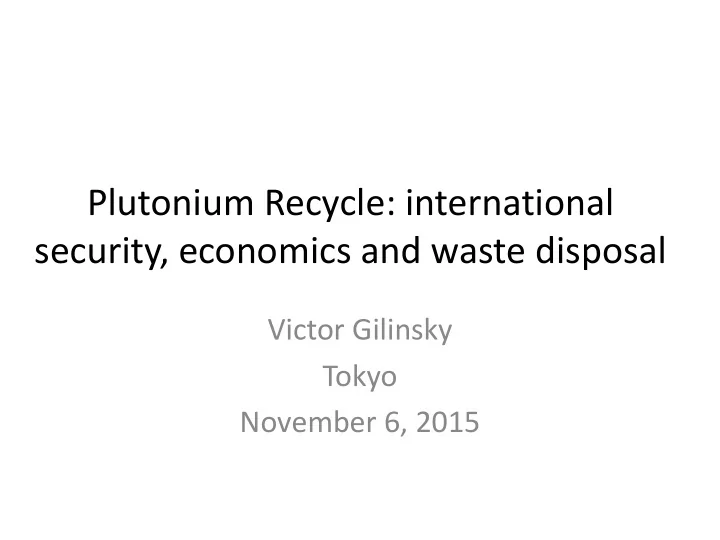

Plutonium Recycle: international security, economics and waste disposal Victor Gilinsky Tokyo November 6, 2015
Treat plutonium as fuel — or explosive? • The original goal of the world’s nuclear community was eventual reliance on advanced reactors fueled with plutonium • It’s an attractive concept, but it ignored (1) economics, and (2) the international dangers of relying on a nuclear explosive • We don’t have adequate protection against countries using their plutonium for nuclear weapons, if they later so decide • IAEA inspection can’t warn in time because separated plutonium can be put to weapon use too quickly • For this reason, US President Ford concluded in 1976 that use of plutonium fuel should stop until the world “can effectively overcome the associated risks of proliferation ” • We are still not able to “effectively overcome” the risks • We need restrictions, but they can gain acceptance only if they apply to all , including advanced and weapons countries
Plutonium: unfavorable economics • Today, even eminent Japanese scientists and former officials who support Rokkasho concede that plutonium recycle is not economic (see CSIS interviews on vimeo.com) • For example, Professor Atsuyuki Suzuki (Emeritus, Tokyo University) maintains it is important to prove plutonium recycle technology, but says it is “ economically unnecessary ” to operate the plutonium fuel cycle commercially • Rokkasho has become a “white elephant” • Nevertheless, its nuclear supporters see it as a link to their original dream of plutonium-fueled advanced reactors • But the objective of a plutonium-fueled future now appears less and less realistic economically • And, more importantly, it is incompatible with international security, which should be the overriding consideration
Does reprocessing aid waste disposal? • A pro-reprocessing argument is that it reduces waste volume and simplifies waste disposal in costly geologic repositories • In reality, reprocessing complicates radioactive waste storage and disposal, and increases risks of accidents and leaks • It is also doubtful that there will even be any geologic repositories, at least in democratic countries like the US, Japan, and Britain — because of public resistance • Despite many promises by nuclear agencies, none of these countries has even started building a geologic repository • Realistically, radioactive waste — either spent fuel or reprocessing waste — will stay in surface facilities indefinitely • The simplest, cheapest, and safest approach is to put spent fuel in “dry casks” (about 100 casks per reactor lifetime)
Recommend
More recommend